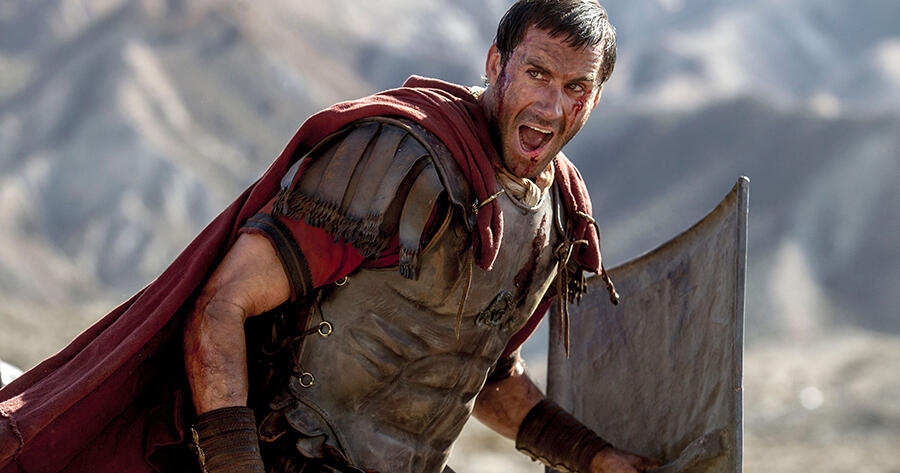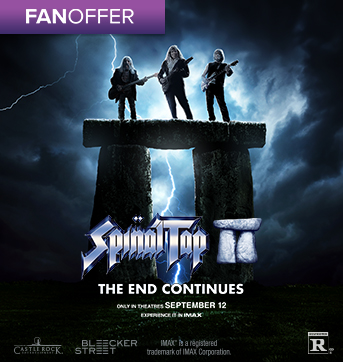In Risen, Joseph Fiennes is a Roman soldier essentially playing out an episode of CSI: Jerusalem. He’s faced with a baffling mystery: the tomb of the executed criminal Jesus is empty, his body gone. (And yes, viewers surely know the solution to this puzzle well in advance.) In honor of a movie that actually dares to try something new with well-trod biblical material, let’s run down some of the more famous examples of Hollywood riffing on these ancient stories.
Ben-Hur (1959)
When people talk about Ben-Hur, they talk about its gigantic scope or that iconic chariot race. But this epic, one of the most famous movies ever made, climaxes at the crucifixion of Christ, where Charlton Heston’s vengeful and violent Judah says, “And I felt his voice take the sword out of my hand.” While the film isn't overtly religious, its final message -- the power of faith helps one heal -- cannot be ignored. Here is a moving tale of religion smuggled inside an old-school Hollywood epic.
Life of Brian (1979)
Monty Python’s Life of Brian was instantly controversial upon release and it remains a sore spot for some people today. However, if you’re willing just to sit back and enjoy it (and sustain a few clever barbs pointed at your personal belief system), it’s one of the funniest and most philosophically minded comedies ever made. As a portrait of the time and place that would have led the creation of a religion, it’s a masterpiece. As a silly comedy that uses a biblical setting to create a variety of truly inspired pieces of sketch comedy, it’s a genuine classic.
The Last Temptation of Christ (1988)
It’s often hard to believe that Martin Scorsese’s The Last Temptation of Christ inspired protests when it was first released. Whether you personally identify with the movie’s specific view of Jesus Christ or not, it is a profoundly spiritual film that finds one of American cinema’s greatest artists grappling with his faith. By casting American actors like Willem Dafoe as Jesus and Harvey Keitel as Judas, the film asks the audience to look upon the titular character and his disciples as human beings who struggle with faith the same way that any modern person would. The result is a movie about the crisis of faith and, more importantly, how one can overcome doubt and embrace belief.
The Prince of Egypt (1998)
The stories of the Old Testament lend themselves well to the vast landscape of animation, so it’s surprising that The Prince of Egypt stands alone as one of the few animated biblical movies ever given wide release. The story of Moses and the exodus of the Jewish people from Egypt has rarely been told better. This version has the edge on any live-action telling because it’s full of catchy songs and its gorgeous animation captures the mystical and the impossible without breaking a sweat.
The Passion of the Christ (2004)
Mel Gibson’s The Passion of the Christ was controversial upon release and it remains controversial today, both because of its content and its director’s offscreen behavior. However, its uniqueness cannot be denied. Here is a major Hollywood movie (a box office smash hit, if you’d forgotten) that is told entirely in an ancient language and refuses to look away from the violence that the Bible’s Jesus would have endured on the day of his death. This is a strange case study even before you get to the genuinely effective horror-movie touches, like the genuinely creepy manifestation of Satan that torments several characters.
Noah (2014)
Noah never got a fair shake from either side of the religious aisle. Secular audiences wrote it off as a simple Bible story. Religious audiences were irritated by its many divergences from holy text. Darren Aronofsky’s film actually falls somewhere in the gray area between them. The eclectic director approaches the vague text of the Old Testament like a filmmaker would approach a fantasy novel, filling in the gaps and creating an ancient and unknowable world with rich detail. By imagining the ancient preflood world as something we have never seen before, Aronofsky paints a proper portrait of a land that cannot be understood, a land that existed before God decided to start over.















